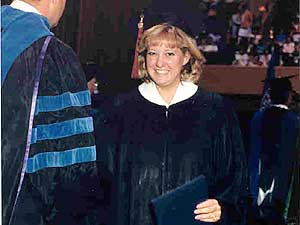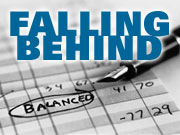|
Photos
Your Voice
|
Learning about debt the hard way
January 27, 2003
 |
| MPR's Cara Hetland on her graduation day from Drake University in 1987. (Photo courtesy of Cara Hetland) |
Sioux Falls, S.D. — I'll be the first to admit I had a really good time in college. Had we taken those "most likely to" votes in high school, I suspect I'd have been given the "most likely to follow the rules" award, or something equally unexciting. I was involved in everything in high school, from drama to student government.
I chose to attend Drake University in Des Moines, Iowa, partially for its journalism program, but mostly because I wouldn't know anyone. I wanted to find myself.
I'll never forget my first night in my dorm room, with my Virginia-native, stranger-of-a-roommate. I ran through my list of high school achievements, then asked what she did. After a very long, uncomfortable pause, she said, "socialize." I thought to myself, "Well, that's something I don't know how to do." We both taught each other a lot during the four years we lived together.
I have to say that I did fairly well managing my personal finances my first three years of college. My senior year, I got not one, but two credit cards. And the story changed.
I drove a 1977 Oldsmobile Cutlass. Mechanics liked to see me coming. My dad's personal favorite purchase was a $32 radiator cap. No reason for it, except some man with grease under his nails told me if I bought it, I'd make it home to Omaha safely. "Put it on my card," I said laughing.
Now, my credit cards were the "only for emergencies" kind. It was an emergency (for me) when I ran out of makeup and switched to the department store, behind-the-glass kind. It certainly was urgent that I needed a new dress to attend a dance with my long-distance boyfriend. Equally important was each phone call, and yes, even the second trip that year to Denver, to try and patch together that relationship.
I took my only spring break trip my senior year. I switched from tap beer to bottled. My tastes certainly exceeded my bank account. I quite simply spun out of control, and there was no one who knew. And no one I wanted to tell. College was for experimenting, right?
So, I had some choices to make. Never did it occur to me to stop spending or change my habits. My choices were more along the lines of deciding which bill to pay. My parents gave me a monthly allowance to pay my room and board. I was responsible for the phone bill and my entertainment costs.
That darn phone bill. I'm certain my life would have been different if there had been e-mail in the '80s. So as to not let down my roommates, I used my rent money to pay the phone bill. I think you can see where I'm headed, and it's not all that important to continue here. Needless to say, when I graduated from college, I owed everyone money.
I'll never forget that first phone call from a collection agency -- the panic I had when I couldn't even come up with $20 to make a minimum payment. The shame I felt. Then my sorority house wanted my rent money, and on and on it went.
Because I had such a good time in college learning to socialize, I wasn't very marketable. TV and radio stations were not knocking on my door. I babysat. I worked in a daycare. I even took inbound phone calls for a telemarketing firm -- not what I thought $40,000 in tuition would get me. So, don't forget about my student loans.
My parents wouldn't bail me out. They did make it good with my sorority house, but I had to pay them back. I cut up my credit cards, but the bills didn't stop coming. I learned minimum payments didn't get me very far -- but that's all I could do. No matter where I went, the debt followed me.
I was so excited when I went to work for MPR back in 1989. I made good money -- I think it was $13,000 a year. I had to get an apartment, a new car, a TV, a cordless phone, and on and on it goes. By the time I made all my monthly payments, I had about $30 a month for food and gas.
Again, choices to be made. This time it was between cigarettes and food. I chose food. The meals I could make out of flour, eggs and water. I also chose to put some of my living expenses on my credit card. I made fewer phone calls. I found myself in a hole that was deep and getting deeper.
Over time, my paycheck got a little fatter and I was able to pay off my credit cards. I ended up marrying a man who is fiscally tight, and I gladly step back and let him manage our money. We have children. I often wonder which one of us is going to have more success teaching them about money. I certainly know which parent will understand if there's trouble. My mother tells me she knew I had to learn the hard way.
In doing my research for this series, I suppose my parents were right to let me suffer. My credit report is now clean, and it all worked out in the end. Which is what my ever-optimistic mother would tell you always happens. But it doesn't always work out.
It was stupid to spend money the way I did. I had to turn a corner personally before I could get my finances under control. It took a lot of work and sacrifice. I cringe when I think what would have happened if I had gotten sick. I understand how it can happen. I know how easy it is to fall behind. It's much harder to simply catch up -- let alone get ahead.
|
News Headlines
|
Related Subjects
|

